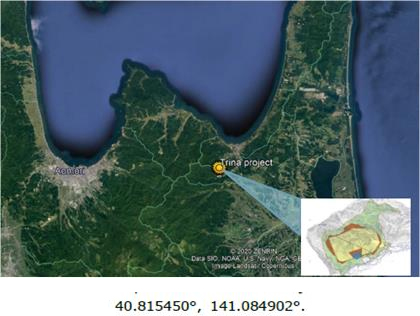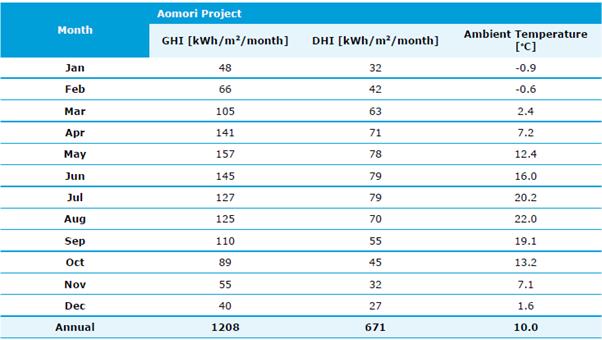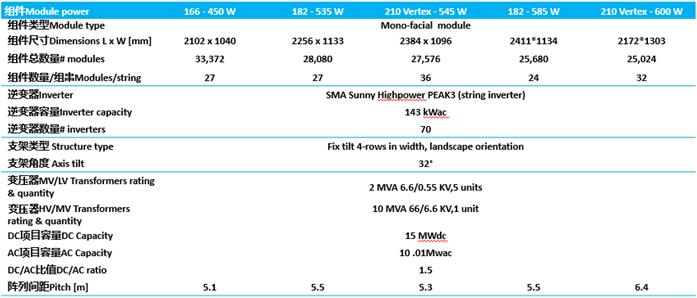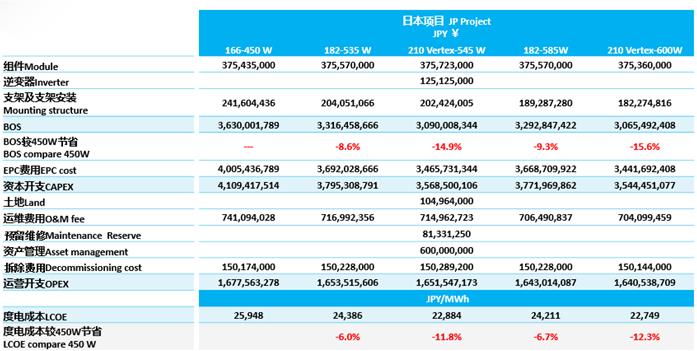The Way to Best LCOE (III)
- 21/03/09
- Business of Solar
BOS Costs Reduced by 6.3%, DNV GL Report on Trina Solar Vertex 210mm Modules’ Advantages with Fixed Tilt Underlines Value in Both BOS and LCOE
In February 2021, the internationally authoritative third-party organization DNV GL began the third round of assessment of the BOS cost and LCOE of Trina Solar’s 210mm Vertex modules. The assessment took place in Aomori prefecture, Japan. In the assessment, the BOS cost and LCOE were compared between two sets of 210mm Vertex module and 182mm module both with landscape-fixed tilts. Trina Solar’s Vertex 210mm 545W mono-facial modules can cut the BOS cost by up to 6.3% and LCOE by 5.8% compared with the 182mm 535W mono-facial modules, the report said, and the Vertex 210mm 600W mono-facial module performs just as well in reducing BOS and LCOE (5.6%) compared with the 182mm 585W module.
Where the assessment took place
In Aomori prefecture on the island of Honshu, with coordinates and conditions as follows:


Local GHI & DHI and ambient temperature data
At the site, with the 166mm 450W mono-facial module as the benchmark, DNV GL compared the BOS cost and LCOE of the Vertex 210mm 545W mono-facial module and the 182mm 535W mono-facial module, as well as the Vertex 210mm 600W mono-facial module and the 182mm 585W mono-facial module with landscape-fixed tilts. In this assessment, the capacity of the AC side was 10 MW with the same DC/AC ratio, and the four-row landscape-fixed tilts commonly used in Japan and mainstream string inverters were adopted.
In order to objectively compare the impact of different types of modules on the BOS cost and LCOE, the project as a whole used similar meteorological data and design input conditions. The five comparisons were all based on local costs to be consistent, comprehensive and objective when comparing local construction cost, on-grid tariffs, operational and maintenance costs, and land costs.

Parameters of the power plants
Assessment results: BOS fell 6.3%, and LCOE fell 5.8%, maximizing customer value
Vertex’s innovative low-voltage design connects 1,500V more modules than is the case with 182mm modules. By connecting 8-9 more modules in a single string, the number of module strings is greatly reduced, allowing significant BOS cost savings and LCOE reduction.
First, it can cut material and labor costs involving DC cables and racking system, and thus reduce initial investment. Second, the ultra-high power can reduce the numbers of modules in the setup and speed up construction, further reducing total investment costs. Finally, with superior power generation, Vertex is able to maximize value for customers by ensuring minimum LCOE.
According to the assessment in Japan, Trina Solar’s Vertex 210mm 545W mono-facial module can reduce BOS by up to 6.3% and reduce LCOE by 5.8% compared with the 182mm 535W mono-facial module, and the Vertex 210mm 600W mono-facial module performs just as well in reducing BOS and LCOE (5.6%) compared with the 182mm 585W module.

Comparison of estimate costs
The DNV GL report thus found that Trina Solar’s Vertex 210 mm module cuts costs in many ways.
As the PV industry embraces grid parity, the Vertex series has a prominent edge in LCOE as a result of Trina Solar's continued push to reduce costs and improve efficiency. This assessment followed two rounds of assessment of Trina Solar Vertex modules by DNV GL, in January and December.
The assessment in December found that the 545W bifacial dual-glass Vertex module with single-axis (1P) tracker has the best LCOE, 3.5% less, and performs significantly better than the conventional 166mm-450W and 182mm-535W modules in BOS costs.
DNV GL's assessment in January focused on the LCOE advantage and value of the Trina 600W+ Vertex Bifacial Dual-Glass Module with Single-Axis 2 portrait installation (2P) tracker. The report found that Trina Solar’s Vertex 210mm bifacial dual-glass module can cut BOS by up to 6.32% and LCOE by 3.72% compared with the 166mm bifacial dual-glass module.
In the report of this third assessment, DNV GL again confirmed the value of Trina’s Vertex modules, being able to maximize value for customers by ensuring minimum LCOE.
Over the coming five years, Trina Solar will strive to forge further ahead as a world leader in smart energy and distributed energy solutions, involving PV, energy storage and hydrogen energy industries. In this way it will contribute to the development of a clean, low-carbon, safe and efficient energy system and the development of renewable energy to achieve the goal of carbon neutrality.
Download the report here:
https://pages.trinasolar.com/DNVGLreport3-APAC.html
If you need more information, please contact us at: VertexValue@trinasolar.com
Relevant Topics
Smart Energy Solutions
delivered straight to your inbox


